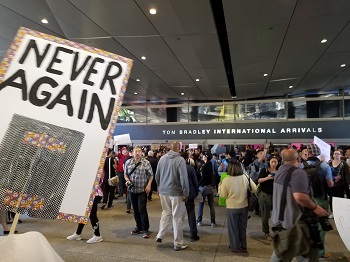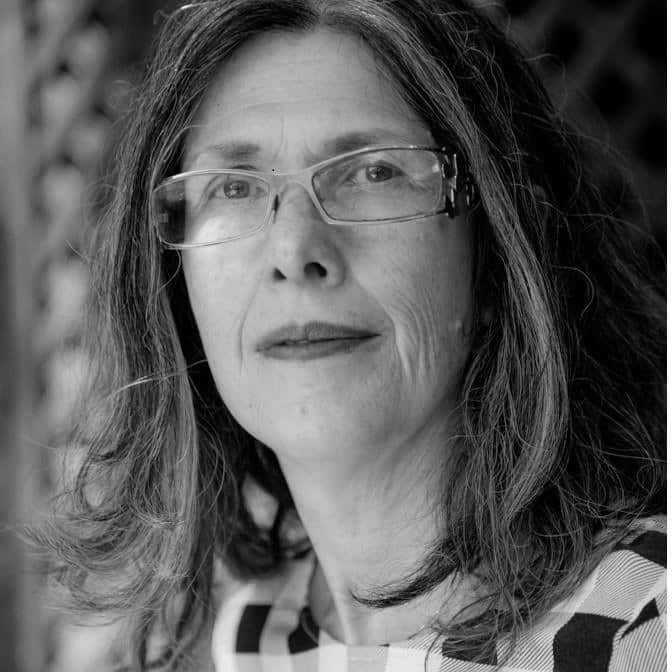
If my lower back could cry, it would. I have been standing in one spot for too long. My neck aches from peering around the shoulders of people taller than I. I am worrying about my friend Jake for whom loud noise can be painful in the extreme. This noise fills every space, presses into my head and vibrates like a living thing; takes me to the edge of my own threshold for pain. And I am filled with joy.
I am part of the great sound, bellowing at the top of my voice, “Say it loud, say it clear, immigrants are welcome here! Say it loud, say it clear, refugees are welcome here! Say it loud, say it clear, Muslims are welcome here!”
The America I love has gathered at this place, the Tom Bradley International Terminal at LAX, filling the sidewalk outside of the Arrivals level, filling the indoor space, allowing travelers through and calling out welcome while making a mighty noise, audible, we are told, to the 15 people who are detained on the other side of a lime green wall bearing the name Pinkberry. The crowd continues to swell as the afternoon shadows lengthen, marching along the sidewalk and the steps leading to the Departures level (again, making room for the travelers and their luggage), lining the balconies of the parking structure across the street. There are thousands of us.
I see Americans of every shade, gender, and size. One young Latina with a curtain of black hair carries a sign reading Angelinos Unidos. We chant Si Se Puede! I see Black Americans in dreadlocks and others in business attire with impeccably styled hair, young people in hoodies who cannot keep still, running joyfully back and forth with banners, and I see two dykely ladies of my acquaintance (newlyweds!) who have brought portable chairs on which to sit their bodies down.
I see hijabs and yarmulkas—mine is a crocheted affair of silver and white. Son of a gun, Trump has done something good in spite of himself; he really did bring Jews and Muslims together! I see a young woman of about twelve with Hermione Granger frizzy hair carrying a homemade sign that reads “Dumbledore’s Army, Still Recruiting.” Lot’s of homemade signs on cardboard or construction paper, some nicely stenciled, others scrawled in a hurry: “They warned me about this in Hebrew school,” “He will not divide us,” “El pueblo unido jamas sera vencido,” and my absolute favorite, “First they came for the Muslims. And we said, “Not today, mother!cker.””
Los Angeles is not alone in protesting and, again, Jews are well represented. On the other side of the country, 20 rabbis led by T’ruah, a rabbinic human rights organization, have been arrested (and released) protesting Trump’s travel ban. HIAS, the Hebrew Immigrant Aid Society, has filed a lawsuit contesting the executive order that instituted the ban.
Why this issue and the Jews? Certainly, many of us have found other things about the Trump campaign and administration to protest. We helped to swell the ranks of The Women’s March, praying on Shabbos, as Rabbi Abraham Joshua Heschel said in another context, with our legs. We have called and written our representatives, seeking “no” votes on Cabinet nominees who have expressed publically their contempt for the agencies they are about to lead.
But this ban on refugees, immigrants and travelers from certain majority Muslim nations (and while, yes, the Obama administration did create a list of countries to watch they did not shut off travel in the way that this administration has); this has resonated with Jews in a particular way. This hits close to home.
We are a people who bear long historical memories. We remember when our eventual compatriots objected to our coming here as refugees and immigrants. We remember the St. Louis. We remember Anne Frank. We remember that, indeed, the very same things as are now being said about refugees from majority Muslim countries were then said about us. That we would bring agendas shaped by radical ideologies. That we were actually spies, agents of the very terror from which we were trying to flee. Or, more nakedly, that we just came with too much difference—our religion, our faces, our flavors and our sounds were just too different from those of the majority for some folks to handle. We were a threat to a perceived national identity.
So we respond to this ban with outrage and grief for two kinds of reasons. Above all, there is our ancient imperative: “You shall not oppress a stranger, for you know the feelings of the stranger, having yourselves been strangers in the land of Egypt.” (Exodus/Vayikra 23:9). Our foundational story is the basis for a command: identify with the harried and the oppressed and the stranger. You are not only to support their cause, you are to have empathy.
And there is our not-so-ancient history in this very land. Those of us who were lucky enough to be born here are so very American indeed. Yes, our people, along with others, did transform this land—with culture and food and union organizing and entrepreneurship and, yes, the lesson that human beings can approach the Divine through different holy paths. We have also been transformed. We are Americans and we are not about to keep silent or allow newcomers to be bullied in our stead.























 More news and opinions than at a Shabbat dinner, right in your inbox.
More news and opinions than at a Shabbat dinner, right in your inbox.